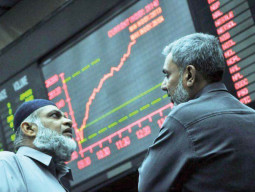
How many people benefited from the growth is another matter entirely, but if we dig deeper, the issues facing our capital markets are of a fundamental nature.
I have written about the taxation issue, which is not clear to both investors and the brokerage community, and the absence of an easily accessible leverage product as the main issues affecting the real activity at capital markets.
The cataclysmic events of the summer and fall of 2008 saw capital going out of Pakistan and the stock market crashing. The KSE was inactive for as much as three and half months with a floor on index value. The national pastime of finding a scapegoat persisted with leverage (popularly known as Badla) being eliminated. Making the market cash-based may have been good for a few investors and foreigners who find Pakistani equity extremely “cheap” and attractive, but for the market itself, it has been catastrophic. Volumes have fallen from an average of 241 million in fiscal year ‘08 to the 95 million in fiscal year ‘11 with many brokerage houses finding it difficult to continue operations.
In the budget of fiscal year 2011, the Capital Gains Tax (CGT) was introduced on sale of shares. The prime reason for introducing this was more to curb speculation than to generate revenues. Even if the CGT is considered a necessity, the process envisaged is cumbersome. It is not the tax but the process of computation and collection which is the problem. A tax was introduced to increase direct taxation, but the result has been that the indirect tax being received has been reduced to negligible levels. In official reports, it makes for nice reading that a new direct tax has been introduced, but ask the decision makers how much this has yielded in actual gains to the exchequer, and they will not have a straight answer. Instead of increasing the tax net, our taxmen have dried up existing taxes.
In the Capital Gains Tax regime, there are multiple slabs for computation. Instead of the slabs, there should be two conditions: 10% CGT on shares held for less than one year while exemption for those who hold shares for more. Second, the collection currently envisages quarterly submission of returns. Instead, it should be at the end of the fiscal year with the returns to be submitted within 90 days of the end of the fiscal year.
Looking objectively, the taxmen have missed an ideal opportunity of actually increasing tax collections without working with the capital markets participants but introduced a tax system that is impractical and has dried up the flow of existing taxes. With our political leaders and taxmen unlikely to step down from their decision of introducing the CGT, a compromise needs to be made.
Let us for once sit together and sort out the issues that inflict the once robust equity markets of our country. The foreign portfolio investor continues to like our market for its inexpensive valuations and most importantly the ease of repatriating capital, but it is the local investor who has been shooed away by the impractical taxation mechanism in place. It is also important for the politicians to come out of the policies being put forth by the bureaucracy, who are traditionally devoid of proposing solutions to problems which have been created by them.
The writer is an investment banker based in Sharjah
Published in The Express Tribune, September 5th, 2011.
COMMENTS (5)
Comments are moderated and generally will be posted if they are on-topic and not abusive.
For more information, please see our Comments FAQ



1730959638-0/trump-(19)1730959638-0-165x106.webp)













@Sharik FBR have access to all trading done through stock exchanges. All investors have a unique ID called UIN which is the CNIC of the individual. So why not 100% audit and why leave 10% loophole?
Excellent suggestions. Pakistans capital markets have great potential, but I wonder why they dont enjoy the best of perception
Dear Ali,
I agree with you on the calculation methods and tax process. Withholding Tax was a better idea. Thousands of investors and traders lost "EVERYTHING" kept as cash deposit and shares with their 'defaulted' brokerage houses during 2008 crisis. Very little done by SECP, KSE and the courts to recover the losses. Market needs "TRUST". Investors have lost trust in the market participants (stock brokerage houses). If this happens then even the removal of CGT will do nothing much favour to the market, leave alone simplification of the process. Foreign investors have already captured OGDC free float but its not wanted for the growth of the market. Local investors don't have much room to earn from this scrip. Index is now easily manipulated by moving heavyweights like NESTLE, OGDC, PPL, NBP and POL. 2008 and 2005 gave good lessons to stock investors and traders who now know that there will be no security for them thanks to defaulted brokers and speculation.
Securities bill being presented for implementation will be the last nail in the KSE coffin. It will take years to bring back confidence while SECP, KSE and also the government needs to come forward and do something attractive for the investors. Govt. IPOs at cheap rates and steps to inject liquidity in the market can revive the market but may take hectic efforts.
The writer makes some useful points. He should be rest assured that various pressure groups will take care of the matter and have the rules bent their way.